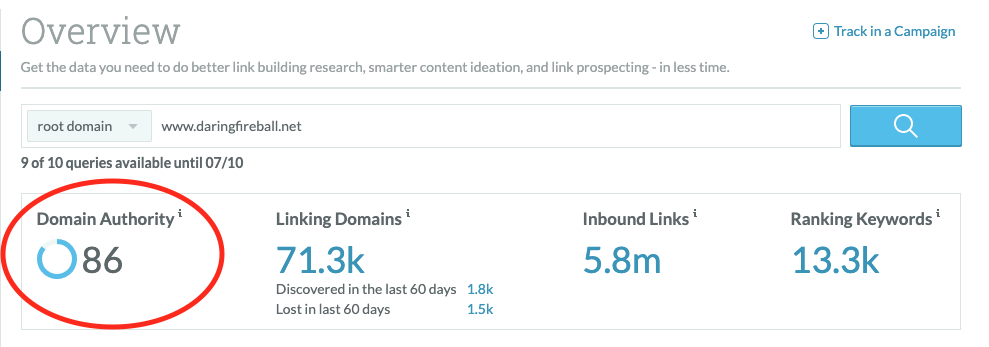
The backlink is like the middle child when it comes to SEO. It is important but not the first thing people think about.
Most people jump right to keywords and it makes sense. It’s what is input into a search engine like Google. We can see the keywords so they must be the biggest influencer when it comes to SEO.
The truth is, there are many factors that impact SEO. Keywords are important but they can only get you so far. Backlinks are important to the SEO puzzle and ignoring them will stunt your SEO efforts.
Keywords
There is no doubt that keywords are important. It’s why we need to do our research to make sure we are picking the right keywords.
There are many tools that can help you do this such as Moz, SEMrush, and one of my favorites, Answer The Public.
I talked about keywords and research last week so I’m not going to rehash that article (you can read it here) but keywords have limits.
There are over 1.5 billion websites on the internet. With so many sites you can imagine that there are many sites using the same keywords.
This is why there are other factors that impact search engine result rankings.
Domain Authority
Search engines want to push people to the best content and this is where domain authority comes in. Domain authority (also referenced as DA) doesn’t impact SEO but it is a byproduct of SEO.
For a user, a search always starts with keywords or a phrase being entered into a search engine such as Google. Behind the scenes, Google is determining the credibility of the sites that are part of the search. Domain authority is a measure of the credibility that your website has.
Domain authority is a way to separate the credible sites from the not so credible sites. If there are 5,000 pages using the same keyword the one with the highest domain authority will win.
There are multiple tools to help you find out what your domain authority is such as Moz’s Link Explorer (other tools will use slightly their own proprietary terms). Moz ranks on a scale of 1-100 with one being the lowest and 100 being the highest.
Let’s look at an example of searching for domain authority with Link Explorer using one of my favorite blogs, Daring Fireball.

The domain authority is circled in red. Daring Fireball’s domain authority is 86 so we know that it has a level of credibility.
We now know that domain authority is the “credibility” that Google and other search engines consider when ranking content in a search but what gives a website credibility?
What is a Backlink?
A backlink, or link back, is a vital ingredient in creating credibility. It’s exactly what you might expect. It’s a link that points back to your website.
Here are a couple of examples of backlinks:


These examples are from posts on the PR Daily website and they link back to previous articles that have been written on their respective websites, Spin Sucks and the Nuts PR blog.
In both these cases, I know that PR Daily has a higher domain authority than either Spin Sucks or Nuts PR.
You may be wondering why this matters. It matters because a site with a higher domain authority gives a site with lower domain authority credibility.
Let’s look at Corina’s article as an example. Because PR Daily has a higher domain authority than her site, this will impact her domain authority in a positive way. If she continues to get backlinks from other sites that have higher authority than hers, she will start to see her domain authority go up.
That was kind of wordy so let me explain another way. If sites with higher domain authority than yours link back to you, the impact, from an SEO perspective, is your site’s domain authority will improve.
Higher domain authority equals more credibility in the eyes of the search engines and it starts with backlinks.
How do you get a Backlink?
Backlinks rarely just happen. We have to earn them. I wrote about this a few weeks ago in an article about using media relations to improve SEO.
Media relations is the act of placing articles with the media. In this case, we want to place articles with online outlets so we can ask for a backlink.
We want to focus on outlets that are relevant. If you’re a SaaS company, it doesn’t make sense to pitch to Sports Illustrated. If you are a medical or dental provider it doesn’t make sense to pitch to Autoweek.
Bigger outlets aren’t necessarily better. While it would be great to place a story with the New York Times, it’s difficult and even if successful, could take a long period of time. Smaller outlets can make more sense but we want to make sure that they have a higher domain authority than we do.
Also, remember that the media isn’t just limited to news websites or online magazines. There are many bloggers out there who write on specific subjects and have high domain authorities such as the Daring Fireball blog.
Domain Authority Research
Like keywords, we need to research domain authority. Earlier I showed you how to find out the domain authority for a site using the Moz’s Link Explorer. They have another tool called Mozbar that is an extension for the Chrome web browser that can also help us do research.
In the example in the previous section I stated that I knew that PR Daily had a higher domain authority than either Spin Sucks or Nuts PR.
In lieu of Link Explorer, I used Google and the Mozbar. Here is what I saw when I did a search for each:



Mozbar gives us the domain authority for each site. This is useful when you’re finding outlets to pitch to get a backlink.
Final Thoughts
Most people pick their keywords and they are done but SEO is a very competitive battleground. There are many things that impact it. Focusing only on keywords is a mistake.
Help your website create authority with the search engines. Find opportunities to get a backlink to your site and your site
- Is Your Marketing Connected? - March 6, 2025
- Stop Planning and Start Strategizing - October 24, 2024
- The Importance of Creating a Connection With Your Marketing - June 6, 2024
